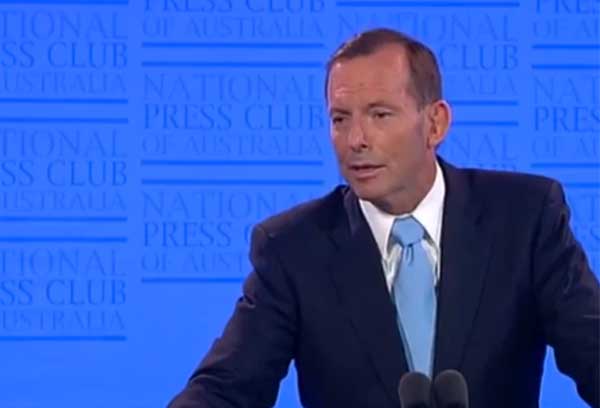Prime Minister Tony Abbott has distanced his party from a controversial Productivity Commission paper outlining methods for Australia’s immigration system to drop its focus on skilled migration and instead let price determine who is granted a visa.
In a discussion paper issued at the start of the month the Productivity Commission identified two options for such a transition, which would see potential migrants either bid for a place or pay a higher set fee to settle in Australia.
Speaking to reporters on Monday morning, the PM noted the Productivity Commission document was only a discussion paper.
“It’s not the policy of the government and I think it’s unlikely to become the policy of the government,” he said.
“Everyone knows that the immigration policy of this government is fairy and squarely based on what is in the best interests and values of our country. That’s the way it is and that’s the way it will stay as far as I’m concerned.”
While a visa bidding system would open a new stream of revenue for the federal government, the Productivity Commission paper warns it could “conflict with equity or fairness objectives” in immigration policy.
“For example, under a charging regime, the family reunion intake would be determined by the willingness and capacity of the immigrant (or their family in Australia) to pay the charge, rather than the period of separation or other individual circumstances of the potential immigrant,” the paper said.
Henry Sherrell, a policy analyst at the Migration Council of Australia, echoed those concerns.

“Locking out poorer migrants could easily occur,” he told New Matilda. “The current system allocates over a third to family placements, many of whom may not be able to afford to buy a place. These migrants bring critical social and cultural benefits to Australia that would be ignored under a price-based system.”
Australia’s immigration system currently focuses on the skill potential migrants bring with them rather than their ability to pay major sums for entry.
According to the Productivity Commission paper: “Almost half of recent permanent immigrants and temporary residents had obtained a bachelor’s degree or higher qualification prior to arrival in Australia.”
Under systems like those proposed by economist Gary Becker – who is referenced in the Commission’s paper – the ability to pay top dollar would be the only factor considered when determining visas, aside from the screening out of particular migrants, such as those who pose a security risk or suffer very poor health.
Advocates of such a system argue less well-off migrants could still come to Australia if a HECS-style loan system was adopted, whereby immigrants borrowed money from the government upon entry and paid it back over time.
Sherrell rejected the idea and said that despite problems in some visa categories, Australia’s migration system was “envied across the world”.
“On face value, a HECS-style loan system might seem attractive. But we fear it would prove unworkable in practice, which would threaten public support for migration in Australia,” he said.
Business and unions have also rejected any move to a price-based system.
The Australian Council of Trade Unions and the Australian Industry Group told Fairfax media the focus on skilled migration should remain, and that shifting it could lead to skills shortages.
Carla Wilshire, CEO of the Migration Council Australia, said her organisation “strongly disagreed” with any such move.
“At a moral level, this runs counter to our deepest held values around equality and fairness. On a practical level, financial means does not equate to the ability to contribute to Australia,” she said.
The Productivity Commission was ordered to write the paper as part of a deal between David Leyonhjelm and the Coalition, which saw the Liberal Democrat senator help pass legislation reintroducing Temporary Protection Visas in exchange for the review.
While Leyonhjelm backs the scheme, it appears to have little or no support at any other point of the political spectrum.
Donate To New Matilda
New Matilda is a small, independent media outlet. We survive through reader contributions, and never losing a lawsuit. If you got something from this article, giving something back helps us to continue speaking truth to power. Every little bit counts.



